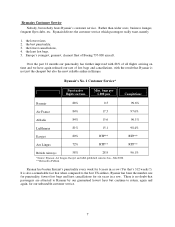Ryanair 2008 Annual Report Download - page 16
Download and view the complete annual report
Please find page 16 of the 2008 Ryanair annual report below. You can navigate through the pages in the report by either clicking on the pages listed below, or by using the keyword search tool below to find specific information within the annual report. 16
Outlook for fiscal 2009
We have taken advantage of the recent weakness in oil prices and are now hedged 90% for
September at $129 per barrel, 80% for Q3 at $124 per barrel, but are unhedged for Q4. We continue to
believe that oil prices remain subject to irrational exuberance. While many of our high fare competitors
continue to increase fuel surcharges, Ryanair remains committed to our guarantee of no fuel surcharges
– ever. We will continue to absorb higher oil costs, even if it means short-term losses, while we
continue to deliver Europe’s guaranteed lowest fares to our 58 million passengers.
We have recently announced capacity reductions for the coming winter at our two highest cost
airports in Stansted (15 aircraft grounded) and Dublin (4 aircraft) where regulatory failure has allowed
these monopolies to further increase their already high airport charges. These high costs make it more
profitable to ground some aircraft rather than fly them at Dublin and Stansted this winter. Despite these
cutbacks, Ryanair’s traffic will still grow by approx. 9% this winter as we switch route and capacity
growth to lower cost airports and bases. Accordingly, passenger volumes for the year will grow by 14%
to 58m, slightly lower than the 16% previously guided.
The demise of low fare air travel is again being predicted by high fare airlines like BA and others
who are still losing shorthaul traffic to Ryanair. Higher oil prices won’t end low fare air travel, it just
increases the attraction of Ryanair’s guaranteed lowest fares, as consumers become more price sensitive
and switch away from high fare/fuel surcharging airlines like BA. Higher oil prices will speed up the
decline of high fare shorthaul travel this winter as many European airlines consolidate or go bust. We
believe that oil prices of approx. $130 per barrel are unsustainable over the medium term, but we don’t
know when they are going to fall. The airline industry is cyclical, and this downturn will provide
enormous opportunities for strong, well financed airlines, such as Ryanair to grow.
The outlook for the remainder of the fiscal year which is entirely dependent on fares and fuel prices
remains poor. The emerging economic recession in the UK and Ireland caused by the global credit
crisis and high oil prices means that consumer confidence is plummeting, and we believe this will have
an adverse impact on fares for the rest of the year. We will respond as always with lower fares and
aggressive pricing to keep people flying and maintain our high load factors. We now believe that our
average fares for the year may fall by as much as 5% if European airfares plunge this winter. Ryanair
will lead this downward pricing at a time when most of our competitors are hoping to raise fares and
fuel surcharges. The market this winter will be heavily impacted by the timing and scale of EU airline
bankruptcies and consolidations which are inevitable at these higher oil prices. Ryanair’s better than
anticipated savings which will flow from capacity and cost reductions already achieved will partly offset
these lower yields. On the basis of our existing fuel hedges, Q4 oil prices at approx. $130 per barrel,
and average fares falling by 5% for the full year, we expect to record a full year result of between
breakeven and a loss of 160m.
The capacity reductions which will ensue from this winter’s wave of airline bankruptcies and
consolidations will create more opportunities for Ryanair to grow. When oil prices fall significantly (as
we believe they will over the medium term) then our earnings should rebound strongly. We have one of
the strongest Balance Sheets in the industry and the business continues to be strongly cash generative
with over 12.2bn in cash. With the lowest fares and lowest cost base in the industry Ryanair is the best
positioned airline In Europe to take advantage of the opportunities that these very difficult trading
conditions will create.
























